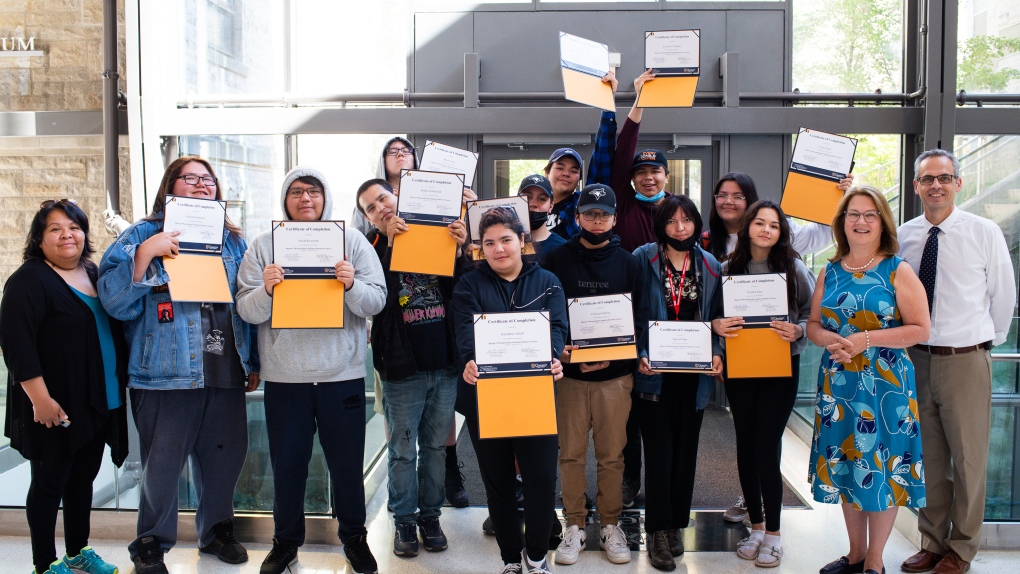New partnership aims to train Indigenous youth in health care
A new partnership between the Weeneebayko Area Health Authority (WAHA), Queen’s University and the Mastercard Foundation is aiming to provide more health-care education to Indigenous youth in the James and Hudson Bay areas to increase the number of health-care workers in the region.
Dubbing it the Queen’s Weeneebayko Health Education Program, the partners said in a news release Tuesday that it will focus on giving Indigenous students culturally appropriate schooling for careers in medicine, nursing, midwifery and other health professions.
The goal, officials said, is to address challenges in accessing health care in remote communities and have it be delivered by locally-trained workers.
"This is a very important initiative for the Weeneebayko Region that will help increase the capacity for culturally-safe health care that is directed and delivered by health professionals from our communities," said WAHA President and CEO Lynne Innes.
"It is exciting to work together on this new approach that will support Indigenous youth as they pursue health-care careers and build a stronger, healthier future for the communities we serve."
The Mastercard Foundation is providing over $31 million to fund the program as part of its larger promise to help educate 100,000 Indigenous people by 2030.
This comes after WAHA’s announcement in January that a planned health care complex in Moosonee is going forward and that it will need staffing—with a potential avenue of supplying those workers by training local Indigenous people.
The partners’ release said the various health care programs could start enrolling students by 2025 and educate as many as 240 students per year. That depends on how quickly they can put quality curricula, learning facilities and employment pathways in place.
Its curriculum will incorporate Indigenous traditional knowledge, focus on culturally-sensitive care and will include placement and recruitment in Far North communities, with the goal of long-term retention.
The goal is to establish a new training site in Moosonee.
High school students from the communities the Far North health authority serves took part in a week-long health sciences camp at Queen’s Kingston campus in August, to get them thinking about careers in the field. It is located next to the city’s general hospital, which regularly treats patients airlifted from the Far North.
 Indigenous students from communities served by the Weeneebayko Health Authority celebrate completing a Queen’s University health sciences summer course in Kingston Ont. in August, 2022. It was part of the soft launch of a partnership aiming to educate far north Indigenous youth to provide healthcare in northeastern Ont. (Supplied)
Indigenous students from communities served by the Weeneebayko Health Authority celebrate completing a Queen’s University health sciences summer course in Kingston Ont. in August, 2022. It was part of the soft launch of a partnership aiming to educate far north Indigenous youth to provide healthcare in northeastern Ont. (Supplied)
"This program will support Indigenous health transformation – improving regional health outcomes, addressing gaps in care delivery and building the Indigenous health workforce,” said Queen’s University’s Health Sciences Dean Jane Philpott.
"We look forward to building this dynamic educational model alongside the Weeneebayko Area Health Authority and local Indigenous leaders and we thank the Mastercard Foundation for supporting this crucial work."
CTVNews.ca Top Stories

'It could be catastrophic': Woman says natural supplement contained hidden painkiller drug
A Manitoba woman thought she found a miracle natural supplement, but said a hidden ingredient wreaked havoc on her health.
WATCH Video shows dramatic police takedown of carjacking suspects chased through parking lot north of Toronto
Police have released video footage of a dramatic takedown of a group of teens wanted in connection with an attempted carjacking in Markham earlier this month.
After hearing thousands of last words, this hospital chaplain has advice for the living
Hospital chaplain J.S. Park opens up about death, grief and hearing thousands of last words, and shares his advice for the living.
DEVELOPING G7 warns of new sanctions against Iran as world reacts to apparent Israeli drone attack
Group of Seven foreign ministers warned of new sanctions against Iran on Friday for its drone and missile attack on Israel, and urged both sides to avoid an escalation of the conflict.
WHO likely to issue wider alert on contaminated cough syrup
The World Health Organization is likely to issue a wider warning about contaminated Johnson and Johnson-made children's cough syrup found in Nigeria last week, it said in an email.
Tesla recalling nearly 4,000 Cybertrucks because accelerator pedal can get stuck
Tesla is recalling 3,878 of its 2024 Cybertrucks after it discovered that the accelerator pedal can become stuck, potentially causing the vehicle to accelerate unintentionally and increase the risk of a crash.
'It was all my savings': Ontario woman loses $15K to fake Walmart job scam
A woman who recently moved to Canada from India was searching for a job when she got caught in an online job scam and lost $15,000.
A couple lost their wedding rings during the ceremony. Two strangers found a fitting solution
Every good wedding has to have one teensy, tiny crisis.
Families to receive Canada Child Benefit payment on Friday
More money will land in the pockets of some Canadian families on Friday for the latest Canada Child Benefit installment.






























